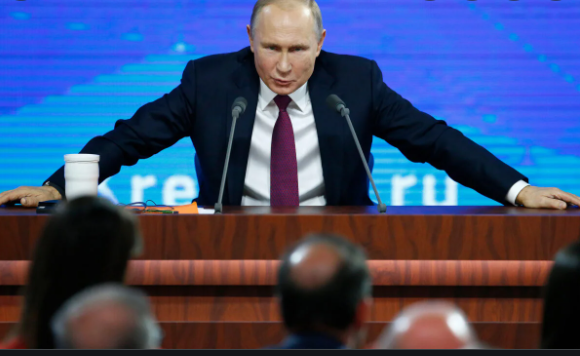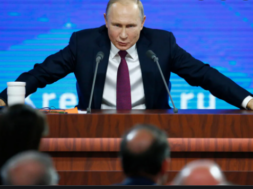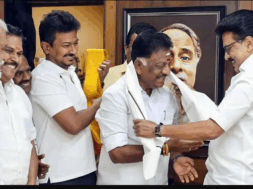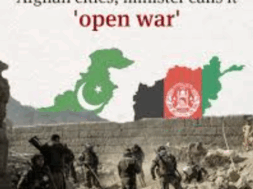
Roving Periscope: Is Ukraine another ‘Chamberlain Moment’ for the West?
Virendra Pandit
New Delhi: Russia is carving out and gobbling up Ukraine piece by piece without going to a full-scale war and the West can do little: this, in brief, is the emerging scenario as of now in the former Soviet Union which disintegrated in 1991 and 15 former republics broke away from it as independent nations.
In the late 1930s, the influenza pandemic and the Great Depression-afflicted Europe had responded similarly, which whetted Adolf Hitler’s appetite, leading to the Second World War (1939-45). Britain’s Prime Minister Neville Chamberlain had, after a dubious ‘assurance’ from Nazi Germany in 1939, proclaimed in London that he had brought ‘peace with honor.’
Now, look at what is happening between Russia, which led the Soviet Union (1917-1991), and Ukraine, a former Soviet republic having a significant Russian-speaking population that is melting away in Moscow. If President Vladimir Putin’s plans succeed, Russia’s revanchist ambitions to revive the USSR in a new format could gather steam and other former Soviet republics could face a Ukraine-like crisis.
But initial responses to the West’s sanctions were underwhelming.
Despite the West clamping the “first tranche” of financial sanctions against Russian recognition to two breakaway regions of Ukraine on Tuesday, the world markets behaved normally. The ‘liberated’ people of the separatist areas greeted Moscow’s brazen act with fireworks—establishing a fait accompli to re-annex the Russian-speaking Donbas region (Donetsk and Luhansk) into the Russian Federation this week.
America’s threats bore little fruit as U.S. President Joe Biden’s first set of sanctions on Russia hit markets not with a bang, but a whimper, the media reported on Wednesday.
The only crucial move against Russia came from Germany, which halted certification of the Nord Stream 2 gas pipeline and threw into jeopardy the USD 11 billion projects that would have cemented Russia’s grip on Europe’s energy sector. Europe depends heavily on Russia for energy supplies.
With war clouds hovering, several countries were panicked that sweeping sanctions could infuriate Russia enough to launch an all-out invasion of Ukraine, which might spark even the Third World War. However, rather than a sweeping package of sanctions to cripple top Russian banks, cut its financial transactions off from the global economy, or singled out President Vladimir Putin, the U.S., and its allies settled on a modest “first tranche” of penalties.
The mid-night sanctions targeted two Russian banks, VEB.RF and Promsvyazbank, and three members of Russia’s elite with close ties to the Kremlin. The penalties also sought to freeze future purchases of Russian sovereign debt.
The fact is that neither the West nor Russia have an appetite to fight a prolonged, expensive war, as their pandemic-pummelled economies are yet to recover fully. Russia itself is the sixth most Covid-19 affected nation worldwide, with over 15 million infections and 348, 000 deaths. Still, when Moscow recognized the western dilemma, it unfolded the strategy against Ukraine. It also fanned a nationalist fever in Russia and diverted the people’s attention from their domestic problems, calculated to make Putin a national hero.
The White House tried to defend its measured approach, as questions swirled over whether their response could deter the Kremlin from mounting a bigger assault. Moscow has denied its plans to invade Ukraine and Putin said he had no current plan to send forces—he even hailed them as “peacekeepers”–into the breakaway areas of eastern Ukraine, although the treaties he signed with the separatist leaders allow him to do so and build Russian bases.
He reiterated it could avert the crisis if Ukraine accepted demands that included recognizing Russian sovereignty over Crimea, annexed in 2014, and renouncing its bid to join NATO, which would bring the West’s military bases right on the Russian borders.
The fresh western sanctions were half-hearted and would have little impact on Russia. One of the banks the US targeted was already under restrictions since 2014, and America had limited prohibitions on Russian sovereign debt in place since 2019.
For these half-measures, hawkish US lawmakers—both the Democrats and the Republicans, have criticized President Biden. Senator Lindsey Graham called the developments “the 1930s all over again,” showing the initial weak-kneed response of France, Britain, and other countries to appease Hitler.
Democrat Senator Bob Menendez, who chairs the Foreign Relations Committee, said the U.S. should levy the “overwhelming amount” of sanctions to deter further Russian aggression. “I don’t know what we need to wait for,” he said, adding “What we can’t have here is another Munich moment,” a reference to a 1938 agreement that allowed Nazi Germany to seize part of Czechoslovakia.
They have criticized President Biden that his White House has once again over-promised and under-delivered on the world stage. This month, his aides publicly insisted they would immediately impose penalties, inflicting significant costs on the Russian economy.













